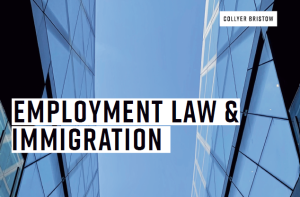
The Team
Our lawyers have the expertise and experience to provide you with creative, personalised solutions in a clear and understandable way.
Our Publications
Discover a wealth of invaluable guidance in the form of guides and brochures written by our expert lawyers.
Our insights
Discover the latest insights and thought leadership from our team of legal experts.
About
1. What is a Tier 2 visa and how do you apply for it?
As a skilled worker looking to work in this country, you may be eligible to apply for a Skilled Worker visa. To qualify for this visa, you must have an official job offer from a UK employer, meet the minimum salary requirement, and be starting a job on the approved list set out by the UK government.
You can apply for your Skilled Worker visa up to three months before your start date at your job in the UK. In some cases you can apply to bring your family members with you. You can discuss this further with a member of our Immigration team.
2. How do I go about extending my UK visa?
Regardless of the type of UK visa you hold, it is very important to ensure you apply for an extension before your current visa expires. This also includes your spouse/partner and any other dependents you may have, paying particular attention to children who may have turned 18 since arriving in the UK. No matter which visa type you are extending, including if you are the sole representative on an Overseas Business visa, there are important steps you must take to allow for a smooth extension of your visa and to limit the risk of delay.
3. How do I obtain a UK Student visa for my child?
If your child is attending an independent school in the UK, you must apply for a Child Student visa. This covers children between the ages of 4 -17 who have an unconditional offer at a private school and access to money to support themselves whilst in this country.
4. How can I add my family to my visa?
The government recognises a ‘dependent’ as being either your spouse, civil partner, unmarried partner, or child under the age of 18. Your dependent(s) could already be living in the UK, waiting to move, or have been born during your time living here. If you are currently in the UK, you can add dependents to your visa online. If you are currently living in another country, they will be required to visit a visa application centre to provide their fingerprints and a photograph.
5. Can I add my partner to my visa?
Yes, you can add a husband, wife, civil partner, or unmarried partner to your visa. It is important to be aware that, if you hold a Representative of an Overseas Business visa, you cannot add your partner to your visa if they own or control a majority of the business. If this is the case, they would need to apply for their own visa and a member of our team can assist you with this.
6. Are there visa benefits for entrepreneurs setting up in the UK?
Yes, if you are an entrepreneur looking to set up a business in the UK, there are several benefits. The Start-up visa is for early stage yet high potential entrepreneurs looking to establish an enterprise in the UK for the first time. An applicant doesn’t require any funding at this stage but does need to be endorsed by an authorised endorsing body on the prescribed list. If you are accepted on the Start-up visa, you are granted entry to the UK for up to 2 years. Switching to an Innovator visa is then a viable option if you wish to continue developing your business in this country.
7. How do I obtain a UK visa for my UK startup?
A Start-up visa differs from an Innovator visa, for which the applicant will generally be an experienced businessperson who wants to establish themselves in the UK. A start-up applicant will not be expected to have this experience.
The Innovator visa applicant must be looking to set up and run a business with potential for growth which is different from anything else on the market and is endorsed by an endorsing body. The individual is required to have funds of at least £50,000 available to invest in their business. This visa grants entry to the UK for 3 years and can be extended. You may also be able to apply for settlement once you’ve been in the country for 3 years.
8. What is a Tier 1 Investor Visa?
A Tier 1 Investor visa is for individuals who have sufficient capital (a minimum of £2m) to invest in active and trading UK businesses. This residency lasts for 3 years and 4 months and applicants can apply to extend this residency for a further 2 years. Investors can then apply for permanent residence after 5 years (or after as little as 2 years, depending on the amount invested in qualifying businesses) and for British citizenship thereafter. Under this option, you are also able to bring your partner and children below of the age of 18 to the UK.
9. What are the different types of UK visa?
When looking to move to the UK, it can be difficult to work out which visa is the best option for you as there are several types available including Work visas, Business visas, Study visas, Visitor visas, Family visas, Settlement visas and Transit visas. Each of these have their own sub-categories to cater for different circumstances and family members can sometimes be added to these. In order to have a smooth application, it can be worth speaking to an immigration lawyer about your situation.
10. I have a number of dependents I want to add to my UK Visa. What are the steps?
The steps you take depend on the type of visa you entered the UK on and how long you have left on it. If you are looking to add children or a partner to your visa, it would be best to contact a member of our Immigration team who can explain the best way to go about doing this.
11. Do I need to apply for a visa to move my employee or is that their responsibility?
As an employer, you have a number of responsibilities when it comes to either hiring foreign workers or your employees moving to the UK for work.
As a UK employer, you will need to ensure that the employee has the requisite skills and will be paid the appropriate salary for the role. You will also need to provide them with a certificate of sponsorship and have appropriate human resources processes in place to keep account of all sponsored employees.
Immigration law can be complicated and there is the risk that your licence may be revoked or downgraded for non-compliance. To ensure you are fully compliant and acting in the best interests of your business, you should seek advice from our Immigration team.
12. If I am relocating to the UK with my family, when do I need to apply for my visa?
If you are applying for a spouse or children then you should check which visa is relevant to you. Some visas will only allow family to visit for up to 6 months so your situation and how long you want them to stay will impact your options.
13. Do I need to reapply for visas for my employees after Brexit?
As immigration law is constantly changing, you will need to regularly review the visa status of your employees. If they are EU workers, you will need to ensure they have applied for residency or (pre-)settled status before 1 July 2021 in order to avoid disruption to your business. Of course, depending on the type of employee and their situation, it is likely they will need to apply for a Skilled Worker visa if they were not living in the UK before December 2020.
Caroline HollisChartered Legal Executive (FCILEx)
Charles AvensPartner - Head of Immigration
+44 20 7468 7234 +44 7778 309 594charles.avens@collyerbristow.com
Spotlight
Sponsor licence applications
Where UK businesses want to employ nationals from outside the European Economic Area and Switzerland, they are likely to need a sponsor licence to be able to do so. To be successful in applying for the licence, an employer must be able to show that it is a genuine and legitimate organisation, that it poses no risk to immigration control, and that it has robust systems in place to be able to comply with its sponsorship duties. We regularly advise employers on these applications, ensuring that they have the correct supporting documentation in place, that they appoint the relevant key personnel required for the licence, and that they have the necessary monitoring and record-keeping systems in place to meet their sponsor requirements.
Spotlight
Tier 1 visa applications
“Wealthier individuals can use the Tier 1 Investor visa route to come to the UK. By investing a minimum of £2m in UK trading companies, successful applicants can live, work and study in the UK. The rules governing these visas have been subject to recent revisions, so we advise applicants in navigating a course through the latest changes. We also combine this advice with careful estate planning, to minimise the exposure to UK taxes once the applicant is in the UK.
Other recent changes have ended the Tier 1 Entrepreneur visa category, replacing it with new Innovator or Start-up visas. These visas are nascent concepts, so it is important that careful advice is sought to ensure a successful application.”
Spotlight
Tier 2 visa applications
Where a UK business holds a sponsor licence, it can employ overseas workers in the UK to carry out specific skilled roles. We advise employers on obtaining the relevant ‘certificate of sponsorship’ required for each visa holder and guide them and their future employees through the application process. Where necessary, this involves advising on compliance with the ‘resident labour market test’, whereby a role must first be offered to a worker from the UK or the EU, unless an exception applies. We also advise on ‘intra-company transfer’ visas, where employees of an overseas business come to work for a group company in the UK. These applications commonly involve contemporaneous applications from family members accompanying the main visa holder to the UK.
Quick glance: publications
- Future of Work: Employment and Immigration Update Seminar Slides
- Employment and Immigration Expertise
- CB Destination UK: essential pre-arrival planning
- Coming to the UK visa categories – Student Visa guide
- Coming to the UK visa categories – Complete guide
- Healthcare and care worker visa
- Hong Kong (British nationals overseas visa) UK immigration guide
- Coming to the UK visa categories – Individual guide
Immigration FAQs Publications
Future of Work: Employment and Immigration Update Seminar Slides
These slides summarise key insights from The Future of Work: A New Era – Employment and Immigration Seminar. They highlight the most significant upcoming changes in UK employment and immigration law, including the Employment Rights Bill, hybrid working practices, AI in the workplace, and Skilled Worker visa reforms. Designed for employers and HR professionals, the slides provide practical guidance on preparing for these developments, helping organisations stay compliant and strategically ready for the evolving workplace landscape.
Employment and Immigration Expertise
An overview of our Employment and Immigration services.
CB Destination UK: essential pre-arrival planning
Collyer Bristow is highly experienced in acting for HNW/UHNW individuals looking to relocate or return to the UK. This document outlines the key tax, estate planning and immigration areas which may be relevant to you, your clients or your employees when moving to the UK.
Coming to the UK visa categories – Student Visa guide
Considering an education in the UK? This guide covers all the different visa options available to students.
Coming to the UK visa categories – Complete guide
Considering a move to the UK? This guide covers all the different visa options available to individuals and businesses for a worry-free relocation.
Healthcare and care worker visa
For applicants who will work for the NHS / NHS suppliers, this guide provides a step-by-step process on how to obtain the Tier 2 Health and Care Worker Visa.
Hong Kong (British nationals overseas visa) UK immigration guide
Curious about the new Hong Kong BN(O) Visa and how this can apply to you? Find out more in our Hong Kong BN(O) Visa UK immigration guide.
Coming to the UK visa categories – Individual guide
Considering a move to the UK? This guide covers all the different visa options available to individuals for a worry-free relocation.
Immigration FAQs insights
Shorter Reads
The Skilled Worker Visa: A New Era?The Skilled Worker Visa: A New Era?
Read more
Longer Reads
Rapid rise in UK Skilled Worker visas expected as US introduces $100,000 fee for H-1B Work VisaRapid rise in UK Skilled Worker visas expected as US introduces $100,000 fee for H-1B Work Visa
Read more
Longer Reads
UK Global Talent Visa Explained: Benefits, Eligibility & Application ProcessUK Global Talent Visa Explained: Benefits, Eligibility & Application Process
Read more
Shorter Reads
No Place Like Home? UK Proposes Changes to the Qualifying Period for Permanent Residence and Citizenship in the UKNo Place Like Home? UK Proposes Changes to the Qualifying Period for Permanent Residence and Citizenship in the UK
Read more
Podcasts
Across Borders: UK & Australian Immigration LawAcross Borders: UK & Australian Immigration Law
Listen now
Podcasts
Navigating UK Immigration: From Visas to Citizenship with Charles AvensNavigating UK Immigration: From Visas to Citizenship with Charles Avens
Listen now
Shorter Reads
How to register as a British citizenHow to register as a British citizen
Read more
Shorter Reads
How to apply for a British passport if you were born in the UKHow to apply for a British passport if you were born in the UK
Read more
Shorter Reads
How to Apply for a British Passport If You Were Born Abroad to a UK CitizenHow to Apply for a British Passport If You Were Born Abroad to a UK Citizen
Read more
Shorter Reads
Electronic Travel Authorisation (ETA) SchemeElectronic Travel Authorisation (ETA) Scheme
Read more
Shorter Reads
UKVI eVisa SchemeUKVI eVisa Scheme
Read more
Longer Reads
DESTINATION UK: Relocation advice for HNW individuals, business owners, entrepreneurs and familiesDESTINATION UK: Relocation advice for HNW individuals, business owners, entrepreneurs and families
Read more
You might also like
Need some more information? Make an enquiry below
Immigration FAQs key contacts
- Charlie
FowlerPartner
Talk to Charlie about UK trusts, tax & estate planning, Immigration, International trusts, tax & estate planning, Private wealth and Wills & succession planning
Immigration FAQs
In today’s world in which people and their business affairs are increasingly international, immigration plays a critical role. However, the legal framework governing global mobility is constantly changing and, with Brexit adding another layer of complexity, it is becoming an ever more challenging field for individuals and organisations to navigate.
The Team
Our lawyers have the expertise and experience to provide you with creative, personalised solutions in a clear and understandable way.
Our Publications
Discover a wealth of invaluable guidance in the form of guides and brochures written by our expert lawyers.
Our insights
Discover the latest insights and thought leadership from our team of legal experts.
1. What is a Tier 2 visa and how do you apply for it?
As a skilled worker looking to work in this country, you may be eligible to apply for a Skilled Worker visa. To qualify for this visa, you must have an official job offer from a UK employer, meet the minimum salary requirement, and be starting a job on the approved list set out by the UK government.
You can apply for your Skilled Worker visa up to three months before your start date at your job in the UK. In some cases you can apply to bring your family members with you. You can discuss this further with a member of our Immigration team.
2. How do I go about extending my UK visa?
Regardless of the type of UK visa you hold, it is very important to ensure you apply for an extension before your current visa expires. This also includes your spouse/partner and any other dependents you may have, paying particular attention to children who may have turned 18 since arriving in the UK. No matter which visa type you are extending, including if you are the sole representative on an Overseas Business visa, there are important steps you must take to allow for a smooth extension of your visa and to limit the risk of delay.
3. How do I obtain a UK Student visa for my child?
If your child is attending an independent school in the UK, you must apply for a Child Student visa. This covers children between the ages of 4 -17 who have an unconditional offer at a private school and access to money to support themselves whilst in this country.
4. How can I add my family to my visa?
The government recognises a ‘dependent’ as being either your spouse, civil partner, unmarried partner, or child under the age of 18. Your dependent(s) could already be living in the UK, waiting to move, or have been born during your time living here. If you are currently in the UK, you can add dependents to your visa online. If you are currently living in another country, they will be required to visit a visa application centre to provide their fingerprints and a photograph.
5. Can I add my partner to my visa?
Yes, you can add a husband, wife, civil partner, or unmarried partner to your visa. It is important to be aware that, if you hold a Representative of an Overseas Business visa, you cannot add your partner to your visa if they own or control a majority of the business. If this is the case, they would need to apply for their own visa and a member of our team can assist you with this.
6. Are there visa benefits for entrepreneurs setting up in the UK?
Yes, if you are an entrepreneur looking to set up a business in the UK, there are several benefits. The Start-up visa is for early stage yet high potential entrepreneurs looking to establish an enterprise in the UK for the first time. An applicant doesn’t require any funding at this stage but does need to be endorsed by an authorised endorsing body on the prescribed list. If you are accepted on the Start-up visa, you are granted entry to the UK for up to 2 years. Switching to an Innovator visa is then a viable option if you wish to continue developing your business in this country.
7. How do I obtain a UK visa for my UK startup?
A Start-up visa differs from an Innovator visa, for which the applicant will generally be an experienced businessperson who wants to establish themselves in the UK. A start-up applicant will not be expected to have this experience.
The Innovator visa applicant must be looking to set up and run a business with potential for growth which is different from anything else on the market and is endorsed by an endorsing body. The individual is required to have funds of at least £50,000 available to invest in their business. This visa grants entry to the UK for 3 years and can be extended. You may also be able to apply for settlement once you’ve been in the country for 3 years.
8. What is a Tier 1 Investor Visa?
A Tier 1 Investor visa is for individuals who have sufficient capital (a minimum of £2m) to invest in active and trading UK businesses. This residency lasts for 3 years and 4 months and applicants can apply to extend this residency for a further 2 years. Investors can then apply for permanent residence after 5 years (or after as little as 2 years, depending on the amount invested in qualifying businesses) and for British citizenship thereafter. Under this option, you are also able to bring your partner and children below of the age of 18 to the UK.
9. What are the different types of UK visa?
When looking to move to the UK, it can be difficult to work out which visa is the best option for you as there are several types available including Work visas, Business visas, Study visas, Visitor visas, Family visas, Settlement visas and Transit visas. Each of these have their own sub-categories to cater for different circumstances and family members can sometimes be added to these. In order to have a smooth application, it can be worth speaking to an immigration lawyer about your situation.
10. I have a number of dependents I want to add to my UK Visa. What are the steps?
The steps you take depend on the type of visa you entered the UK on and how long you have left on it. If you are looking to add children or a partner to your visa, it would be best to contact a member of our Immigration team who can explain the best way to go about doing this.
11. Do I need to apply for a visa to move my employee or is that their responsibility?
As an employer, you have a number of responsibilities when it comes to either hiring foreign workers or your employees moving to the UK for work.
As a UK employer, you will need to ensure that the employee has the requisite skills and will be paid the appropriate salary for the role. You will also need to provide them with a certificate of sponsorship and have appropriate human resources processes in place to keep account of all sponsored employees.
Immigration law can be complicated and there is the risk that your licence may be revoked or downgraded for non-compliance. To ensure you are fully compliant and acting in the best interests of your business, you should seek advice from our Immigration team.
12. If I am relocating to the UK with my family, when do I need to apply for my visa?
If you are applying for a spouse or children then you should check which visa is relevant to you. Some visas will only allow family to visit for up to 6 months so your situation and how long you want them to stay will impact your options.
13. Do I need to reapply for visas for my employees after Brexit?
As immigration law is constantly changing, you will need to regularly review the visa status of your employees. If they are EU workers, you will need to ensure they have applied for residency or (pre-)settled status before 1 July 2021 in order to avoid disruption to your business. Of course, depending on the type of employee and their situation, it is likely they will need to apply for a Skilled Worker visa if they were not living in the UK before December 2020.
Charlie FowlerPartner
View Charlie Fowler's profileAbbie ArmstrongAssociate
View Abbie Armstrong's profileCaroline HollisChartered Legal Executive (FCILEx)
View Caroline Hollis's profileCharles AvensPartner - Head of Immigration
View Charles Avens's profileIzel UzunParalegal
View Izel Uzun's profileSPOTLIGHT
Sponsor licence applicationsopen
Where UK businesses want to employ nationals from outside the European Economic Area and Switzerland, they are likely to need a sponsor licence to be able to do so. To be successful in applying for the licence, an employer must be able to show that it is a genuine and legitimate organisation, that it poses no risk to immigration control, and that it has robust systems in place to be able to comply with its sponsorship duties. We regularly advise employers on these applications, ensuring that they have the correct supporting documentation in place, that they appoint the relevant key personnel required for the licence, and that they have the necessary monitoring and record-keeping systems in place to meet their sponsor requirements.
Tier 1 visa applicationsopen
“Wealthier individuals can use the Tier 1 Investor visa route to come to the UK. By investing a minimum of £2m in UK trading companies, successful applicants can live, work and study in the UK. The rules governing these visas have been subject to recent revisions, so we advise applicants in navigating a course through the latest changes. We also combine this advice with careful estate planning, to minimise the exposure to UK taxes once the applicant is in the UK.
Other recent changes have ended the Tier 1 Entrepreneur visa category, replacing it with new Innovator or Start-up visas. These visas are nascent concepts, so it is important that careful advice is sought to ensure a successful application.”
Tier 2 visa applicationsopen
Where a UK business holds a sponsor licence, it can employ overseas workers in the UK to carry out specific skilled roles. We advise employers on obtaining the relevant ‘certificate of sponsorship’ required for each visa holder and guide them and their future employees through the application process. Where necessary, this involves advising on compliance with the ‘resident labour market test’, whereby a role must first be offered to a worker from the UK or the EU, unless an exception applies. We also advise on ‘intra-company transfer’ visas, where employees of an overseas business come to work for a group company in the UK. These applications commonly involve contemporaneous applications from family members accompanying the main visa holder to the UK.
Immigration FAQs Publications
- Future of Work: Employment and Immigration Update Seminar Slides
- Employment and Immigration Expertise
- CB Destination UK: essential pre-arrival planning
- Coming to the UK visa categories – Student Visa guide
- Coming to the UK visa categories – Complete guide
- Healthcare and care worker visa
- Hong Kong (British nationals overseas visa) UK immigration guide
- Coming to the UK visa categories – Individual guide
Immigration FAQs insights
Shorter Reads
The Skilled Worker Visa: A New Era?The Skilled Worker Visa: A New Era?
Read more
Longer Reads
Rapid rise in UK Skilled Worker visas expected as US introduces $100,000 fee for H-1B Work VisaRapid rise in UK Skilled Worker visas expected as US introduces $100,000 fee for H-1B Work Visa
Read more
Longer Reads
UK Global Talent Visa Explained: Benefits, Eligibility & Application ProcessUK Global Talent Visa Explained: Benefits, Eligibility & Application Process
Read more
Shorter Reads
No Place Like Home? UK Proposes Changes to the Qualifying Period for Permanent Residence and Citizenship in the UKNo Place Like Home? UK Proposes Changes to the Qualifying Period for Permanent Residence and Citizenship in the UK
Read more
Podcasts
Across Borders: UK & Australian Immigration LawAcross Borders: UK & Australian Immigration Law
Listen now
Podcasts
Navigating UK Immigration: From Visas to Citizenship with Charles AvensNavigating UK Immigration: From Visas to Citizenship with Charles Avens
Listen now
Shorter Reads
How to register as a British citizenHow to register as a British citizen
Read more
Shorter Reads
How to apply for a British passport if you were born in the UKHow to apply for a British passport if you were born in the UK
Read more
Shorter Reads
How to Apply for a British Passport If You Were Born Abroad to a UK CitizenHow to Apply for a British Passport If You Were Born Abroad to a UK Citizen
Read more
Shorter Reads
Electronic Travel Authorisation (ETA) SchemeElectronic Travel Authorisation (ETA) Scheme
Read more
Shorter Reads
UKVI eVisa SchemeUKVI eVisa Scheme
Read more
Longer Reads
DESTINATION UK: Relocation advice for HNW individuals, business owners, entrepreneurs and familiesDESTINATION UK: Relocation advice for HNW individuals, business owners, entrepreneurs and families
Read more
Need some more information? Make an enquiry below.
Message us on WhatsApp (calling not available)
Please note that Collyer Bristow provides this service during office hours for general information and enquiries only and that no legal or other professional advice will be provided over the WhatsApp platform. Please also note that if you choose to use this platform your personal data is likely to be processed outside the UK and EEA, including in the US. Appropriate legal or other professional opinion should be taken before taking or omitting to take any action in respect of any specific problem. Collyer Bristow LLP accepts no liability for any loss or damage which may arise from reliance on information provided. All information will be deleted immediately upon completion of a conversation.
Close
































